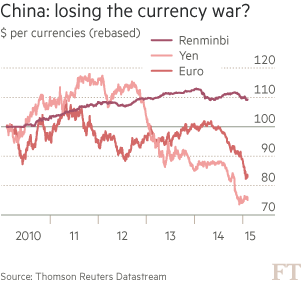(单词翻译:单击)
Jobs growth in the US is back. Over the past three months, official statistics show that the US has added more jobs than in any such period since September-November 1997, at the height of the Clinton boom. The freefall in oil prices is over. The European Central Bank has acceded to market wishes and resorted to “QE” bond purchases. The strong dollar has wrought less damage on US corporate profits than feared. What could possibly go wrong?
美国的就业增长已经恢复。官方数据显示,在过去三个月里,美国新增就业岗位比1997年9月至11月(当时正值克林顿繁荣景象最鼎盛的阶段)以来的任何时期都多。油价结束了急跌走势。欧洲央行(ECB)满足了市场期望,推出“量化宽松”债券购买举措。强势美元对美国企业利润的影响,并未如人们担忧的那么大。还有哪里可能出问题?

The answer, in a word, is “China”. The world’s second-largest economy contributes more towards world growth than any other, and has many tools — due to its enormous foreign exchange reserves — with which to avert a crisis. But the litany of economic indicators flashing reasons for concern is growing longer.
答案很简单,那就是“中国”。中国是全球第二大经济体,它对世界增长的贡献超过其他所有国家,而且有许多规避危机的工具(归因于其庞大的外汇储备)。但引发人们担忧的经济指标正变得越来越多。
Economic growth numbers themselves are notoriously prone to revision. Diana Choyleva of London’s Lombard Street Research, a long-term sceptic on China, estimates that Chinese real growth in domestic product dropped to 5 per cent last year, once the impact of “missing” output “almost equal to the size of Malaysia’s economy” added to the data at the end of last year is stripped out. This would represent a startling slowdown from the trend of the past two decades.
经济增长数据本身向来有修正的余地。伦敦朗伯德街研究(Lombard Street Research)的黛安娜•乔伊列娃(Diana Choyleva)长期以来对中国抱怀疑态度,她估计,一旦考虑“近乎相当马来西亚经济规模”的“遗失”产值对中国去年年底发布的数据的影响,其去年的实际国内生产总值(GDP)增长率就会降至5%。这将意味着,与过去20年的增速相比,中国经济增长出现了惊人的放缓。
Electricity output, a “truth-telling” indicator that is hard to manipulate, is negative for the first time since the crisis year of 2009. Steel production is also its weakest since 2009. The monthly ISM survey of purchasing managers, a great economic leading indicator where figures above 50 indicate that the economy is expanding, while figures below it suggest contraction, has dropped below 50 this month. The prices of the commodities most sensitive to the recently insatiable Chinese demand, iron ore and copper, have fallen severely over the past year.
发电量是一个很难受到操纵、并“可以反映事实真相”的指标,该指标自2009年爆发危机以来首次出现下降。钢铁产量也处于2009年以来的最低水平。每月发布的采购经理人指数本月降至50以下——采购经理人指数是一个灵敏的经济领先指标,当该数据高于50时表示经济扩张,当数据低于50时表明经济收缩。铁矿石和铜是对近年庞大的中国需求最为敏感的大宗商品,它们的价格在过去一年中大幅下跌。
Most concerning should be measures of the financial system. The growth in Chinese bank assets appears to have stalled, following an increase of some $17tn in total debt in the banking system over the six years since the crisis. Managing this number gently down is a priority; the vital question, as ever, is whether the Chinese authorities can do it. The change in banks’ reserve requirements this week, an effective monetary easing, was part of this process, but there is a long way to go.
最令人担心的应该是金融体系的各项指标。中资银行资产增长似乎已经停滞,此前在自危机爆发以来的六年里,银行业体系债务总额增加约17万亿美元。逐步削减债务是中国的优先任务。和以往一样,关键问题是中国当局能否做到这一点。上周调整银行存款准备金率是这一过程的一部分,但中国仍有很长的路要走——调整银行存款准备金率是有效的货币宽松措施。
Atul Lele, chief investment officer at Deltec International, estimates flows of “hot money” by taking the change in foreign exchange reserves, and subtracting the changes that can be explained by trade flows and by foreign direct investment. The balance is “hot money” in that it can be moved swiftly by investors, and it appears to be sharply negative.
Deltec International首席投资官阿图尔•莱勒(Atul Lele),通过将外汇储备变化数值减去贸易及外国直接投资所引起的变动值来估计“热钱”流动的规模。其余额就是“热钱”,因为这部分资金可以被投资者迅速转移,如今这个数值似乎出现了非常大的负值。
Where has it gone? Some of it fuelled the rally at the end of last year, which saw the Shanghai stock exchange gain some 40 per cent in a matter of months. And much will have returned to the booming asset markets of the US.
这部分钱哪里去了?其中一些引发了去年年底股市的上涨——上证综指在短短几个月时间里上涨约40%。还有许多资金应该回流到了美国蓬勃发展的资产市场中。
This is a disquieting scenario. The Fed’s decision on whether to raise rates this summer is a finely balanced one, which is dependent on the data. Friday’s strong jobs report, which also helped show that various data points weighing against a move to more normal rates were either flukes or errors, unarguably raises the probability that US rates will indeed rise this summer.
这种场景令人不安。美联储(Fed)将会仔细权衡才会做出是否在今年夏天加息的决定——这将取决于经济数据。上周五强劲的就业报告无疑提高了美国在今年夏季加息的可能性——该报告也有助于表明,反对转向更正常利率举措的多个数据点,要么是偶然现象,要么是出了错。
This matters for emerging markets, particularly China, which are driven by flows of dollars. When money started to flow back to the US in May 2013 when the Fed talked of “tapering” off QE bond purchases, many emerging markets instantly sold off. A rise in US rates would intensify such problems.
这对新兴市场(尤其是中国)至关重要——新兴市场的经济增长受到美元流入的推动。在2013年5月美国谈论“逐步退出”量化宽松债券购买举措、资金开始回流美国的时候,许多新兴市场立即大跌。美国利率上升将会加剧此类问题。
All of this is a reversal of fortune. In late 2008, it was the aggressive fiscal stimulus by China that helped pull the rest of the world through the Great Recession.
所有这些都代表着形势的逆转。在2008年末,正是中国激进的财政刺激政策帮助全球其他地区渡过了“大衰退”(Great Recession)。
Now, China needs help from exports to the US. The stronger US economy, and the stronger dollar and demand that it implies, should therefore be helpful. But foreign exchange could be a crucial stumbling block. China, long castigated for an artificially weak currency, has allowed its currency to appreciate gently against the dollar over the past five years. With other central banks aggressively easing monetary policy, and thus weakening their currencies against the dollar, this has sharply reduced China’s competitiveness, as the chart shows.
现在,中国需要向美国出口以提振经济。因此美国经济、美元及其所暗含的更强劲需求应该有所帮助,但汇率可能是一大绊脚石。中国一直以来因为人为压低人民币汇率而遭受指责,但已经在过去五年允许人民币兑美元小幅升值。随着其他央行激进地放缓货币政策,从而让本国货币兑美元贬值,中国的竞争力将极大地遭到削弱。
China has let its own currency weaken by about 3 per cent against the dollar over the past year. Further dollar strength may force a more aggressive weakening — which could entail an intensified “currency war,” and financial stress within China.
在过去的一年里,中国已经让人民币兑美元汇率下跌约3%。美元进一步升值可能迫使中国更加激进地贬值人民币——这可能导致一场加强版的“货币战”——以及中国内部出现金融紧张局面。
Playing this out for investors remains difficult. As I said earlier this year, the valuations on offer in the US and emerging markets suggest that a steady move from the former to the latter should pay off over the next decade or so. Abandoning emerging markets altogether is unlikely to pay off.
投资者依然很难摆脱这种局面。正如我今年早些时候说的那样,美国和新兴市场的估值情况表明,逐步从前者向后者转移应该能够在未来十年左右的时间获得回报。完全放弃新兴市场不太可能取得成功。
But the disjunction between the strengthening US and the rest of the world is deepening. Any big shifts in asset allocation would be unwise until that disjunction works itself out.
但经济增长日益强劲的美国和全球其他地区之间的脱节正在加深。在这种脱节状况自我修复之前,资产配置的任何重大转变都将是不明智的。


